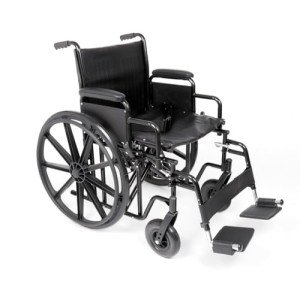Bariatric Folding Wheelchair
Bariatric folding wheelchairs are designed to accommodate users of a larger size. They include a higher weight capacity than basic designs and are built with reinforced materials for included stability and durability.
However, not everybody with a high body mass index (BMI) requires a bariatric chair as many fall within the safe weight limitations of basic wheelchairs.

Size and Weight Capacity
Bariatric wheelchairs have larger seats and are designed to accommodate bigger individuals, generally weighing up to 500 lbs. These chairs have a heavy-duty frame made from enhanced materials like steel and are constructed with larger wheels that offer more weight circulation and maneuverability for larger users.
When comparing bariatric living aids , ensure the weight capacity is noted as fixed or active load. Fixed bariatric transport wheelchair 400 lb capacity describes how much a chair can hold when it's sitting still, while active load capacity is figured out by putting the chair through a drop test that simulates somebody plopping down into the seat.
Basic wheelchairs are extensively produced and created for users with average body weights, making them more affordable than bariatric designs. Medicare and other insurance coverages may only cover a limited number of bariatric wheelchairs, depending on a client's medical requirements and medical diagnosis. These chairs are also more pricey than basic wheelchairs since they have a specialized design and building and construction. Nevertheless, they are a terrific solution for clients with a vast array of medical conditions that require a more comfy travel experience.
Seat Dimensions and Comfort
Unlike basic wheelchairs, bariatric designs have broader seats to accommodate larger people. They likewise have more robust frames and big, resilient wheels that can stand up to higher loads. They can be tailored with different seating options and devices based upon the user's needs and preferences.
When comparing wheelchairs, it's important to take a look at their weight capacities under both fixed and active load rankings. Fixed load refers to the chair's optimum capacity when it's sitting still, while active load measures just how much a wheelchair can safely hold when somebody sits in it and moves. Some manufacturers might also display the weight limit of a bariatric wheelchair in kgs, which is typically more accurate since it considers the typical bodyweight of an individual who uses the chair.
In addition to a large seat, a bariatric folding wheelchair needs to have adjustable cushioned leg rests to help users stay comfy while taking a trip. It must likewise have turn up armrests that can be moved out of the way to prevent getting in the user's way when they want to stand or transfer to another surface.
If you're considering a bariatric wheelchair, ask a health care service provider or mobility professional for recommendations. They can examine your needs, recommend the ideal chairs for you, and guide you through the process of buying one. They can likewise assist you compare functions and prices to find a wheelchair that best fits your budget plan. They can even use suggestions on other mobility solutions such as power placing systems and iLevel seating.
Weight and Portability
While basic wheelchairs are usually economical, bariatric chairs tend to be a bit more expensive. This is because of their specialized design and building and construction, as well as the fact that they're a little much heavier than their equivalents.
If you're worried about the cost of a bariatric chair, talk to a doctor or mobility specialist. They'll have the ability to assess your unique needs and identify which type of wheelchair is the very best fit for you. They can also advise wheelchair devices based on your particular requirements. In addition, if you're wanting to get your wheelchair covered by insurance coverage, such as Medi-Cal, they can guide you on the actions involved in this process. To learn more, read our guide to wheelchair insurance protection. Then, you can begin your journey towards independent mobility.
bariatric high back wheelchair and Handling
Choosing the ideal wheelchair can be an important decision for those with minimal mobility. Bariatric wheelchairs provide increased weight capabilities and are created to accommodate bigger individuals. They generally include larger wheels, wider armrests and seating options, and are sturdier than standard wheelchairs.
When choosing a bariatric wheelchair, consider the person's particular requirements and the environment in which they will be using it. Assess the weight capacity and seat measurements, and search for adjustable functions like padded elevating leg rests to support convenience and ease of transfer.
Figure out whether the wheelchair appropriates for manual or powered use. For included versatility, a bariatric folding wheelchair can be quickly folded and compressed for storage or transport. This makes them a perfect option for those with limited home area or who need to travel fars away. The wheelchairs also include leak evidence wheels to make sure resilience and low upkeep. Ideal for users as much as an optimum of 35 stone.
